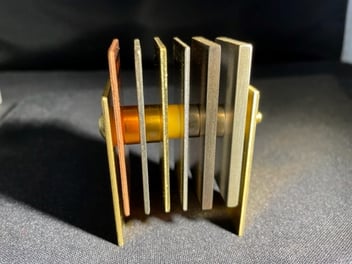SCA Coolant Additives in Your Heavy-Duty System
SCA coolant additives are an important tool in the maintenance of your vehicle's system and winning the fight against corrosion, particularly for heavy-duty vehicles using conventional coolants (i.e., not organic acid technology or hybrid organic acid technology).

Source: Department of Energy
In this case, we'll mostly focus on Class 7 and 8 vehicles, which include things like garbage trucks, city buses, cement trucks (SCA coolant additives do also have rail and marine applications).
What exactly are SCA coolant additives and what do they do for the aforementioned vehicles?
- What SCA coolant additives are (and how you might think of them as a sports drink for your car)
- What SCA coolant additives do
- The different types of SCAs available
- Dober solutions in the SCA coolant additives space
What SCA Coolant Additives Do
SCAs, or supplemental coolant additives, are formulations added to the coolant stream to provide, as the name suggests, supplemental anti-corrosion and cavitation (or liner pitting) protection. Liner pitting is a significant problem in heavy-duty vehicles like the ones previously mentioned. SCA coolant additives adhere to the liner and serve as a sort of protective coating or shield. The consistent slamming of the pistons with the liner eventually creates little bubbles, or cavitation, in the liner that can in turn become holes.
As you can imagine, that can create all sorts of problems for the safe and efficient operation of your vehicle. Having these issues can also cause you a lot of headaches in the form of time and money, particularly if you're someone who, for example:
- Manages a fleet of heavy-duty trucks,
- Oversees a city's bus fleet
- Run a business that requires heavy-duty transportation (e.g., furniture)
Think of SCA coolant additives like your favorite sports drink. Whether you're running a marathon, playing some basketball in the park or even doing yard work on a hot summer day, you will perspire quite a bit. In the process, you risk dehydration if you don't replenish your body with fluids but, more specifically, electrolytes. Electrolyte imbalance in your body can lead to a wide range of consequences, including irregular function of the heart (the engine of the body).
So, to help bring your electrolyte levels back where they need to be, you might have a sports drink or even an electrolyte-rich snack, like a banana. In that sense, these replenishing foods and drinks are like the SCAs of the body.
To continue this analogy, just like the body needs to replenish its electrolytes when it's been working hard, heavy-duty vehicles using conventional coolants will need to have additives replenished at regular intervals.
As we've noted elsewhere, corrosion and liner pitting are significant problems in your vehicle. Corrosion of various components in the system can have a harmful impact on your system's heat-transfer capabilities. As for liner pitting, that can result in holes in your cylinders and leaking coolant onto other parts of the engine.
Needless to say, the stakes are high. Corrosion and cavitation can prove costly in terms of both vehicle maintenance or, in the ultimate worst-case scenario, potential injuries associated with operating an overheated and/or internally compromised vehicle.
Testing Levels of SCA Coolant Additives
By adding SCA coolant additives to your coolant, you can maintain consistent performance and effective cooling over time, particularly for heavy-duty trucks expected to be workhorses over hundreds of thousands of miles. Going back to the aforementioned electrolyte analogy, health problems can come about if you have too little or too much electrolytes in your system.
Similarly, too much or too little SCA coolant additives added to the coolant stream can be harmful to your vehicle's system.
As such, it's important to test your coolant for SCA coolant additive levels. To that end, there are a number of test strip kits on the market designed to determine your SCA coolant additives levels. Using those test results, you can assess whether your vehicle requires a jolt of supplemental coolant additives to reinhibit your coolant and provide liner protection reinforcement.
Different Types of SCA Coolant Additives
SCA coolant additives can be delivered in a variety of forms, including:
- Liquids
- Tablets
- Powders
Dober SCA Coolant Additives
Dober offers SCA coolant additives with varying formulations.
For example, TR84718 is a borate and nitrite formulation with a treat rate of 25,000-mile intervals (or as needed). Meanwhile, TR84739 is a borate and molybdate formulation, also administered at 25,000-mile intervals (or as needed). Both are performance tested according to the standards laid out in ASTM 5752.
If you're interested in learning more about Dober SCA coolant additives, download our Performance Fluids product catalog.




